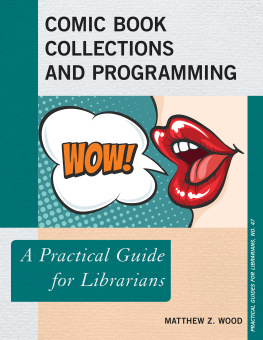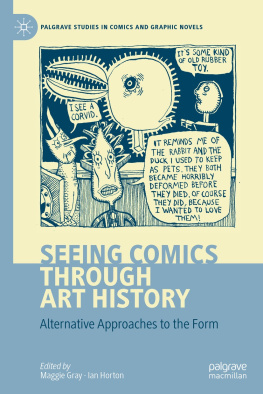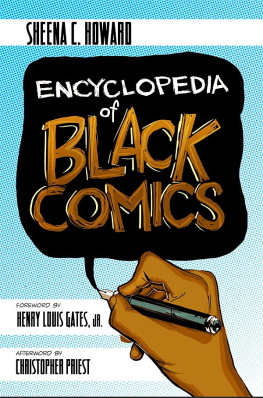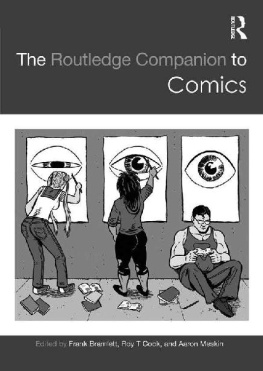THE SECRET ORIGINS OF CO MICS STUDIES
In The Secret Origins of Comics Studies, todays leading comics scholars turn back a page to reveal the founding figures dedicated to understanding comics art. Edited by comics scholars Matthew J. Smith and Randy Duncan, this collection provides an in-depth study of the individuals and institutions that have created and shaped the field of Comics Studies over the past 75 years. From Coulton Waugh to Wolfgang Fuchs, these influential historians, educators, and theorists produced the foundational work and built the institutions that inspired the recent surge in scholarly work in this dynamic, interdisciplinary field. Sometimes scorned, often underappreciated, these visionaries established a path followed by subsequent generations of scholars in literary studies, communication, art history, the social sciences, and more. Giving not only credit where credit is due, this volume both offers an authoritative account of the history of Comics Studies and also helps move the field forward by being a valuable resource for creating graduate student reading lists and the first stop for anyone writing a comics-related literature review.
Matthew J. Smith is Professor and Director in the School of Communication at Radford University in Virginia. Along with Randy Duncan, he is co-editor of Routledges Advances in Comics Studies series. Previously, the two writing partners teamed with former DC Comics President and Publisher Paul Levitz to produce The Power of Comics: History, Form, and Culture (2nd Edition).
Randy Duncan is Professor of Communication and Director of the Comics Studies Minor at Henderson State University. He is co-editor, with Matthew J. Smith, of the Eisner-nominated Critical Approaches to Comics: Theories and Methods. He is a co-founder, with Peter M. Coogan, of the Comics Arts Conference and received the Inkpot Award for contributions to Comics Studies.
First published 2017
by Routledge
711 Third Avenue, New York, NY 10017
and by Routledge
2 Park Square, Milton Park, Abingdon, Oxon OX14 4RN
Routledge is an imprint of the Taylor & Francis Group, an informa business
2017 Taylor & Francis
The right of Matthew J. Smith and Randy Duncan to be identified as the authors of this work has been asserted by them in accordance with sections 77 and 78 of the Copyright, Designs and Patents Act 1988.
All rights reserved. No part of this book may be reprinted or reproduced or utilised in any form or by any electronic, mechanical, or other means, now known or hereafter invented, including photocopying and recording, or in any information storage or retrieval system, without permission in writing from the publishers.
Trademark notice: Product or corporate names may be trademarks or registered trademarks, and are used only for identification and explanation without intent to infringe.
Library of Congress Cataloging-in-Publication Data
Names: Smith, Matthew J., 1971 editor. | Duncan, Randy, 1958 editor.
Title: The secret origins of Comics Studies / edited by Matthew J. Smith and Randy Duncan.
Description: New York: Routledge, 2017.
Identifiers: LCCN 2016042603 | ISBN 9781138884519 (hardback)
Subjects: LCSH: Comic books, strips, etc.History and criticism. | Graphic novelsHistory and criticism.
Classification: LCC PN6710 .S44 2017 | DDC 741.5/9dc23
LC record available at https://lccn.loc.gov/2016042603
ISBN: 978-1-138-88451-9 (hbk)
ISBN: 978-1-315-71603-9 (ebk)
Typeset in Bembo
by codeMantra
Matt and Randy dedicate this book to Randys fellow Comics Arts Conference organizers: Peter M. Coogan, Kathleen McClancy, and Travis Langley. Their hard work makes possible the conference that has, for a quarter of a century, nurtured young scholars and helped to build a Comics Studies community.
Matt also wishes to express his gratitude to Wittenberg University for its support in the initial development of this project.
Charles Hatfield
Comics made my academic career. They inspired me to keep my nose to the grindstone long enough to become an English professor. Comics Studies gave me the means to imagine myself as a career academic and the passion to work past the hurdles, the daunting rites of passage. But they also made me impatient with doing things the conventional English studies waythat is, they either enabled or forced me to see my discipline from the vantage point of an outsider as well as insider. If comics helped place me in academia, Comics Studies has kept me continually looking for a place.
What could it mean to build a place for a field that cannot quite be placed, one that has operated on the margins and in the interstices among the disciplinesliterature, So what can it mean to build a place for it, and why should that matter?
I do think it matters.
To seek a place, or center, for a field that will not yield to the centripetal force of academic disciplining: that is the contradiction from which Comics Studies speaks. That is the perspective from which the following introduction seeks to (re)tell the history of Comics Studies. My biases, of course, should be taken as just that and not the fault of my fellow contributors or our kind editorsbut I hope that what I have to say will help place in perspective this very book, a timely and much-needed volume on the secret origins of our field.
Until recently, comics scholars have almost always become comics scholars by dint of self-directed independent study (an observation I owe, like many things, to Joseph Rusty Witek). Comics Studies has been an ad-hoc phenomenon, a field generated not by institutional mandate but by the eager scurrying of independent actors, opportunistically seeking niches here and there in which they can study this neglected art form and its culture. Finding ways to study comics academically has been about finding allies and protectors and about learning how to describe comics in terms that make sense within ones home discipline. In my case, Ive been acutely conscious of being a literature scholar who happens to do comicsa matter of not only professional survival but also stubborn pride. But of course the disciplinary fit has not been easy, or seamless. For one thing, I can now see that the refusal (or mistrust) of images has been one of the basic ideological moves of literary studies. For another, the interdisciplinary field of word and image studieswhich is where I have often hung my hatis exactly that, interdisciplinary, and cannot be bound by literary study in the conventional sense that I learned as a student. Finally, my experiences at conferences such as the Popular Culture Association and the International Comic Arts Forum have often involved working with scholars from outside English, a kind of experience that has helped me see my discipline from other vantage points.
Until now, Comics Studies has been only loosely institutionalized, often through klatches of friends and colleagues. It has required much independent study by students and teachers alike. We have made it up on the go. If that has been a source of vitality for Comics Studiesand I believe it hasit has also been a source of difficulty. This has been a field without a hub, like a wheel built from its spokes alone, with no center (no place). Or perhaps there have been contenders for a center, but none so widely recognized as to enable the field to garner attention from the outside, and to grow. Yet now that Comics Studies is a recognized field, I believe we do need to build inward to a centerthat is, we need to find and stake out some specific institutional ground.
Comics Studies is not innocent of history. A great deal of work had already been done in the field before the upsurge of the past 20 years. Its just that that work was scattered, under-recognized, and often unread; teachers and students had to do a lot of independent seeking, with few guides. Though Comics Studies is not a new academic field, until recently we have acted as if it were. The fields history is hard to trace because it happened mainly on the margins rather in the center of anything. It seems that we still often forget that history and what it might tell usthat we reinvent wheels, or that our students end up seeking to reinvent them, because we cannot see where our field has come from. This insight has been driven home to me by years of serving on committees that vetted paper abstracts in order to organize conferences and by the trouble Ive had, until recently, when it comes to pointing students to the essential reference works, landmark texts, important debates, and sponsoring institutions of Comics Studies. To do even that basic work, as an advisor, has been a challenge.
Next page





